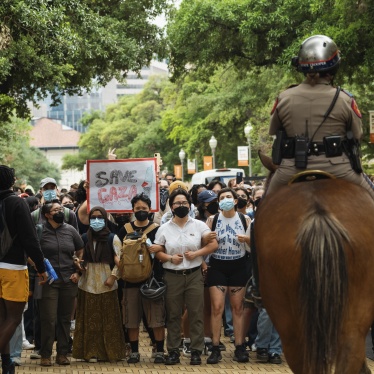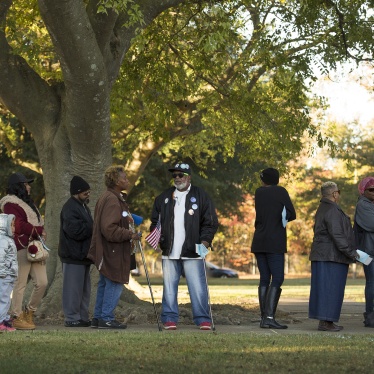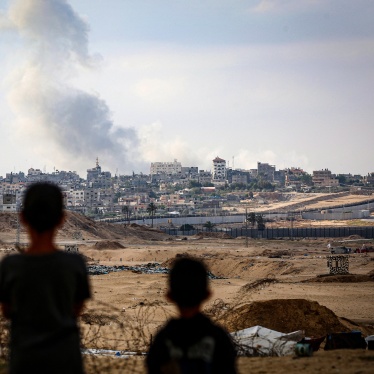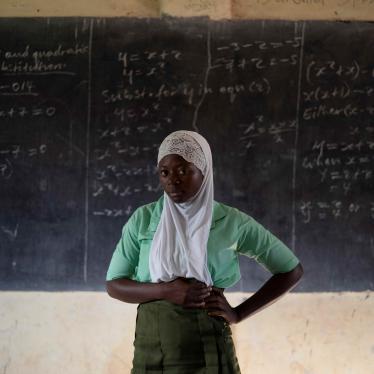Most of the prisoners in Guantanamo were not captured on anything resembling a traditional battlefield, in a traditional war, in which it is easy to tell who is a combatant and who is not.
I believe that the answer to the question this hearing poses is painfully clear. Guantanamo, and the Bush administration’s broader detainee policies, have done profound damage to the moral and legal standards the United States has long championed in the world, and to America’s ability to promote those standards. They have diminished America’s moral authority, alienated its friends, encouraged its enemies, and, ironically, undermined its ability to wage an effective struggle against terror. The only way for the United States to regain the moral high ground – and the initiative in that struggle – is to close Guantanamo and to change the policies for which the prison has come to stand.
What is it about Guantanamo in particular that has hurt America’s standing? Is it fair that the United States has taken so many hits from its friends over the camp and the policies surrounding it? After all, as the administration often reminds us, the Geneva Conventions allow the detention without charge of combatants in wartime for the duration of the conflict in which they were caught fighting. The United States has held such people as prisoners of war in every past conflict, without giving them access to lawyers or courts. Why is this case different?
For one thing, most of the prisoners in Guantanamo were not captured on anything resembling a traditional battlefield, in a traditional war, in which it is easy to tell who is a combatant and who is not. Most were not even captured by the United States, but by Pakistan and by various Afghan militias, who picked a tiny handful of the tens of thousands of foreign men who were fleeing Afghanistan after the fall of the Taliban regime, and sold them for bounties to U.S. forces, even as other, more important al Qaeda and Taliban leaders managed to escape. Still others were detained as far afield as Bosnia and Thailand and the Gambia. The U.S. government hasn’t even claimed that most of these men were fighting the United States; many are accused of little more than living in a house or working for a charity linked to the Taliban. They are part of a broad, amorphous universe of people who are suspected to have had some association with international terrorism. The administration has prosecuted some people in this category in civilian courts; it has released others outright; for reasons that often appear entirely random, it has chosen to hold some in Guantanamo without charge.
The laws of war do indeed allow the United States to detain without charge for the duration of an armed conflict combatants captured on a battlefield. They also, by the way, allow the United States to kill combatants on the battlefield without warning or hesitation. In other words, they allow governments engaged in armed conflict to do things to combatants that they would never be allowed to do to civilians. That’s why maintaining a crystal clear distinction between combatants and civilians is so important.
What the Bush administration has done in Guantanamo is to blur that distinction – to apply the highly permissible rules governing a military battlefield to anyone anywhere in the world who is suspected of having any association with terrorism. It is treating the laws of war as a license to kill or detain without charge anyone who the President determines to be a threat to the national security of the United States. And if the President of the United States can do this, then by definition, the leader of any other country can, too. And the United States loses its ability to complain when other governments do the same thing – whether to their own citizens or to Americans – for their own narrow ends.
Here, in a nutshell, are the arguments the administration has made to the world through its detainee policies: First, the whole world is a battlefield in an open-ended war on terror. Anyone the chief executive of a country believes to be associated with terrorism is a combatant in that war, and can therefore be killed or held without charge. Second, such people can be seized anywhere, at any time, without judicial authorization, and if the leader of a country considers them especially dangerous, he can hold them in secret for as long as he likes. Governments can also subject such prisoners to “enhanced” interrogation procedures, including techniques such as water boarding, extended sleep deprivation, and excruciating stress positions, even though such practices have been prosecuted as torture by the United States for over a hundred years.
To demonstrate how dangerous this is, I’d like to ask you something I wish the administration had asked itself before it embarked on these policies.
Imagine if another government – let’s say, for the sake of argument, the government of Iran – set up a prison camp on some island to which it claimed its domestic laws did not apply, and that it held there, without charge or trial, several hundred men of multiple nationalities, captured outside of Iran, who it accused, based on classified evidence, of supporting groups it claimed were hostile to Iran.
Imagine if some of these prisoners were Americans – not soldiers, but contractors, or diplomats, or aid workers – seized not on a battlefield, but by a private militia off the streets of an Iraqi city, and then sold for bounties to the Iranian intelligence service. Imagine if those Americans were ultimately given a hearing – not before a court, but before a panel of Iranian military officers – to confirm the legality of their indefinite detention. Imagine if those Americans tried to say that they had been tortured by their interrogators, but that the Iranian tribunal kept this testimony secret because it didn’t want Iran’s enemies to learn how it interrogates prisoners.
What would be talking about here today if this was happening? Would any member of Congress or official of the Bush administration defend Iran’s right to do such things?
Now, imagine if the intelligence service of the United Kingdom suspected a lawful U.S. resident of sending money to the IRA in Northern Ireland, or the secret police in China or Burma accused an American of supporting rebels in their country, and on that basis, kidnapped that American off the streets of Baltimore or Miami, bundled him on a plane, and held him for years in a secret facility, hidden even from the International Committee of the Red Cross. How would the U.S. government react? Would the president say “sure, no problem, I guess that guy was considered an enemy combatant over there in Burma or China so I can’t really complain?” If it happened to one of your constituents, Mr. Chairman, would it matter to you if some official in the U.S. intelligence community had given Burma or China permission to whisk that American away?
Or, just for the sake of argument, imagine if the president of Russia declared that his country was engaged in a global war on terror, and that anyone with any connection to any group that supported separatist elements in places like Chechnya was a combatant in that war who could be detained or shot or poisoned wherever he was found, whether in Moscow, or Berlin, or, just for the sake of argument, London.
Clearly, we live in a world in which such things are possible. But do we want to live in a world where they are considered legitimate? That is what is at stake here. Whether we will preserve the legal and moral rules we have struggled to develop over generations to limit what governments – and here I mean not just the United States but all governments – can and can’t do to people in their power. And whether the United States will have the credibility to remain the world’s preeminent champion of those rules.
Now, it is important to note that nothing the administration has done in Guantanamo or anywhere else is remotely as horrible as what happens every day to the victims of cruel dictatorship around the world. The United States is not Sudan or Cuba or North Korea. The United States is an open, democratic country with strong institutions--its Congress, its courts, its professional military leadership – which are striving to undo these mistakes and uphold the rule of law. There is no question that before long we will look back on these last few years as a sad, but brief, departure from American traditions of justice.
But in the meantime, we need to remember that the United States is the most influential country on the face of the earth. The United States is a standard setter in everything it does, for better or for worse.
When Saddam Hussein tortures a thousand people in a dark dungeon, when Kim Jong Il throws a hundred thousand people in a prison camp without any judicial process, no one says: “Hey, if those dictators can do that, it’s legitimate, and therefore so can we. But when the United States bends the rules to torture or unlawfully detain even one person, when the country that professes to be the world’s leading protector of human rights begins to do – and to justify – such things, then all bets are off. The entire framework upon which we depend to protect human rights – from the Helsinki Final Act to the Geneva Conventions and treaties against torture – begins to fall apart.
The United States still can promote human rights, and it does. President Bush can still champion democracy and stand with courageous dissidents from around the world, as he did earlier this month in Prague. And whenever he does, we should applaud him. But it has become almost impossible for the U.S. government to criticize certain kinds of human rights violations around the world, especially torture, indefinite detention, and disappearances. And it is simply an undeniable, objective fact that when President Bush talks about his freedom agenda today, most people around the world do not conjure images of women voting in Afghanistan, or of Ukrainians and Georgians marching for democracy, or of American aid dollars helping activists in Egypt or Morocco fight for reform. Even America’s closest friends now turn their minds to Guantanamo, to unlawful renditions, to secret prisons and to the administration’s tortured justifications for torture.
These policies have not only discredited President Bush as a messenger of freedom, they also risk discrediting the message itself. Because the whole idea of promoting democracy and human rights is so associated with the United States, America’s fall from grace has emboldened authoritarian governments to challenge the idea as never before. As the United States loses its moral leadership, the vacuum is filled by forces profoundly hostile to the cause of human rights.
Around the world, including in the OSCE region, authoritarian governments are leading a backlash against human rights defenders, democracy promoters, and civil society groups. When we call these governments out for violating a universal standard, they now have a stock reply: “Guantanamo is the new universal standard. The United States does what it has to do, and so do we.”
A couple of years ago, Human Rights Watch was meeting with the Prime Minister of Egypt, and we raised a case in which hundreds of prisoners rounded up after a terrorist bombing were tortured by Egyptian security forces. The Prime Minister didn’t deny the charge. He answered, “We’re just doing what the United States does.” We’ve had Guantanamo and the administration’s interrogation policies thrown back in our face in meetings with officials from many other countries, including Saudi Arabia, Jordan, Pakistan and Lebanon. U.S. diplomats have told us they face the same problem. A U.S. ambassador to a leading Middle Eastern country, for example, has told us that he can no longer raise the issue of torture in that country as a result.
After President Bush chided Egypt in his recent speech on democracy in Prague, the Egyptian parliament's foreign relations committee issued a statement that Bush should have talked about Guantanamo prisoners, "deprived of the simplest legal defense guaranteed by all human rights conventions." When Secretary of State Rice recently, and rightly, criticized Hugo Chavez’s government in Venezuela for violating human rights, Venezuela’s Foreign Minister shot back: “How many prisoners do they have in Guantanamo?”
The master of the tactic is Russia’s president Vladimir Putin, who uses it preemptively to ward off criticism of Russia’s slide back to authoritarianism. Just before the recent G-8 summit, a reporter asked Putin about his human rights record, and he immediately shifted the subject: “Let’s see what’s happening in North America,” he said. “Just horrible torture… Guantanamo. Detentions without normal court proceedings.”
Now, don’t get me wrong: Putin doesn’t need Guantanamo as an excuse to persecute his critics in Russia. Guantanamo is not the reason why Egypt or any other country tortures and detains prisoners without charge. Still, America’s detention policies are a gift to dictators everywhere. They can use America’s poor example to shield themselves from international criticism and pressure. Guantanamo enables them to say, to their own people as well as to the world, “we are just the same as everybody else.”
Back in the days of the Cold War, when the Helsinki Final Act was adopted, the Communist leaders of Eastern Europe tried to do the same thing. But it didn’t work. Dissidents and ordinary people behind the Iron Curtain knew that America wasn’t perfect. But they believed that the United States was at least dedicated to the principle that governments were bound by law to respect human rights. It was profoundly important to them to know that the government of the world’s other superpower limited its power in accordance with this principle. It gave them hope that a different way of life was possible, and the courage to fight for it.
Leaders like Putin understand how powerful America's example has been in the past, and they use Guantanamo to tear that example to shreds. They use it to tell their people that all this American inspired talk about democracy and freedom is hypocritical rubbish. "Even self-righteous America," they say, "which preaches moral ideals to the world, tortures prisoners and locks people up without a trial. Even America throws away the legal niceties and behaves ruthlessly when it feels threatened. The Americans use human rights talk to beat up their enemies, but they're really just the same as us. And if you think that things can ever be different here or anywhere else, you're just naive."
These are cynical men, and Guantanamo helps them to spread their cynicism. They use it to demoralize dissidents and anyone who's ever been inspired by America's example to demand their human rights. The Bush administration has given them this weapon. It's time to take it away. It is time for the United States to be once again the country it professes to be. It is time for the United States to close this prison and bring its detention policies in line with the values it has long championed to the world.
Can the United States do this and still fight terrorists effectively? The real question is can America fight terrorists effectively if it does not do this? That question may be beyond the scope of this hearing, but I'll just say that I agree with General David Petraeus that:
"Adherence to our values is what distinguishes us from our enemy. This fight depends on securing the population, which must understand that we not our enemies occupy the moral high ground."
I agree with the U.S. Army's new counter-insurgency manual, the U.S. military's basic document for fighting non-traditional foes like al Qaeda, that in such a conflict killing or capturing every enemy fighter is impossible. You win such a fight by cutting off the enemy's "recuperative power" – its ability to recruit new fighters to its ranks. You win by convincing the people in contested countries that your vision and values are more attractive than those of your enemies. As the Army Manual says, illegitimate policies, including "unlawful detention, torture, and punishment without trial," make that task impossible.
Does anyone believe we are really made safer by detaining in Cuba at most a few hundred of the hundreds of thousands of angry young men in the Muslim world who on any given day wish America harm? There is, sadly, no shortage of potential suicide bombers in the world today. Guantanamo makes that problem worse, not better. It creates far more enemies for America than it takes off the battlefield. It is a key source of al Qaeda's recuperative power.
There is no question that some of the people detained there truly are dangerous al Qaeda terrorists, including alleged 9/11 mastermind Khalid Sheikh Mohammed. But by holding these people in military detention, by treating them as combatants, by comparing the "war" with them to the struggle with Hitler, the administration gives them a status symbol they crave. Throughout history, terrorists have longed to be viewed as soldiers in a war, because that status justifies, in their minds, the killing of their enemies. When he was brought before a military review panel in Guantanamo, Khalid Sheikh Mohammed proudly embraced the label of enemy combatant. That is why wise governments have always treated terrorists as the lowest form of criminals, not as combatants.
What should be done with these prisoners if Guantanamo is closed? Again, you have not asked us to specifically address that question, Mr. Chairman. But the administration has admonished its critics for stopping at the simple slogan of "close Guantanamo" and not confronting the dilemma of what comes next. I think that's a fair point. I also think it's fair to acknowledge that there is no straightforward answer to this question. Sending detainees home is not as easy as it sounds, and many detainees shouldn't be sent home because of the risk they will face torture and persecution.
I would be happy to discuss this challenge in further detail if you like. But in short, I believe that those prisoners who haven't committed crimes and who can't be prosecuted, should be sent home. It will take a vigorous diplomatic effort to find appropriate and lawful arrangements in the detainees' home countries and places of asylum for the small number who can't go home. I believe that such an effort could succeed if the United States made a clear, public commitment to close the camp, and enlisted its allies in a common venture.
As for those prisoners who have committed or conspired to commit terrorist crimes, they should be brought to justice before civilian courts. I am tired of hearing that using civilian law enforcement institutions would be a sign of weakness, or of a "pre 9-11" mentality. Since 9/11, the Bush administration's own Justice Department has successfully prosecuted dozens of international terrorist suspects in the civilian courts, putting many away for life in maximum security prisons. In all this time, the system at Guantanamo has succeeded in prosecuting one Australian kangaroo-trapper to a nine-month sentence, which he is serving in Australia. No one else there has been held accountable for their crimes. They remain a source of unending grief for America.
The terrorists who were prosecuted by civilian institutions are, to use one of President Bush's favorite phrases, no longer a problem for the United States of America. Every last one of the prisoners in Guantanamo is a continuing problem for the United States. The system at Guantanamo is a miserable, embarrassing, and complete failure, not just in moral but in national security terms. It has hurt America far more than it has hurt America's enemies. The answer is not to perpetuate this failure, but to end it.







